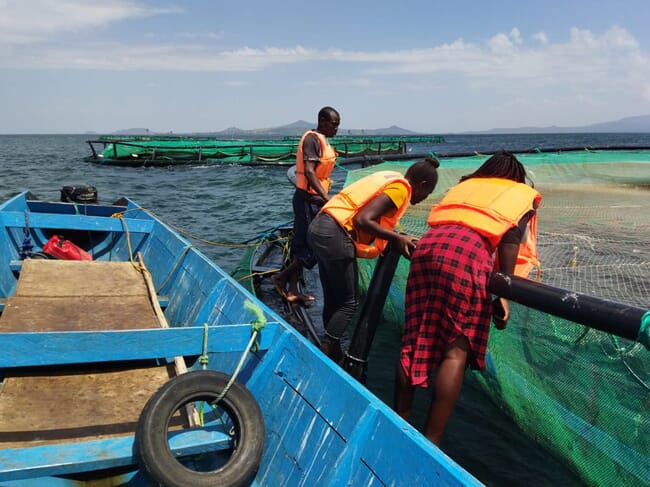
Lake View Fisheries has various tilapia cages on Lake Victoria, consisting of a combination of 14 HDPE cages and 10 metallic cages
Lake View Fisheries, a locally owned tilapia fish farm nestled on Mfangano Island, is on a mission to uplift economically marginalised communities in the region through aquaculture. Their commitment to progress is evident in the recent installation of a recirculating aquaculture system (RAS) for tilapia juveniles, which has enabled them to improve fish survival rates.
On the lake, the company has various cages, consisting of a combination of 14 HDPE cages and 10 metallic cages. Among these, there are twelve 10-metre diameter HDPE cages, two 20-metre diameter HDPE cages, and three sizes of metallic cages: 4x4 metres, 5x5 metres, and 6x6 metes. They also have 21 ponds serving various purposes, including broodstock, nursery, and conditioning.
When it comes to stocking densities, the 10-metre diameter HDPE cages can accommodate 30,000 fingerlings each, while the 20-metre diameter HDPE cages can each house 100,000 fingerlings. The 4x4-metre metallic cages are stocked with 8,000 fingerlings, the 5x5-metre metallic cages can hold 10,000 fingerlings, and the 6x6-metre metallic cages can each support 15,000 fingerlings. These fingerlings weigh 5 grams each at the time of their arrival into the cages from the RAS.
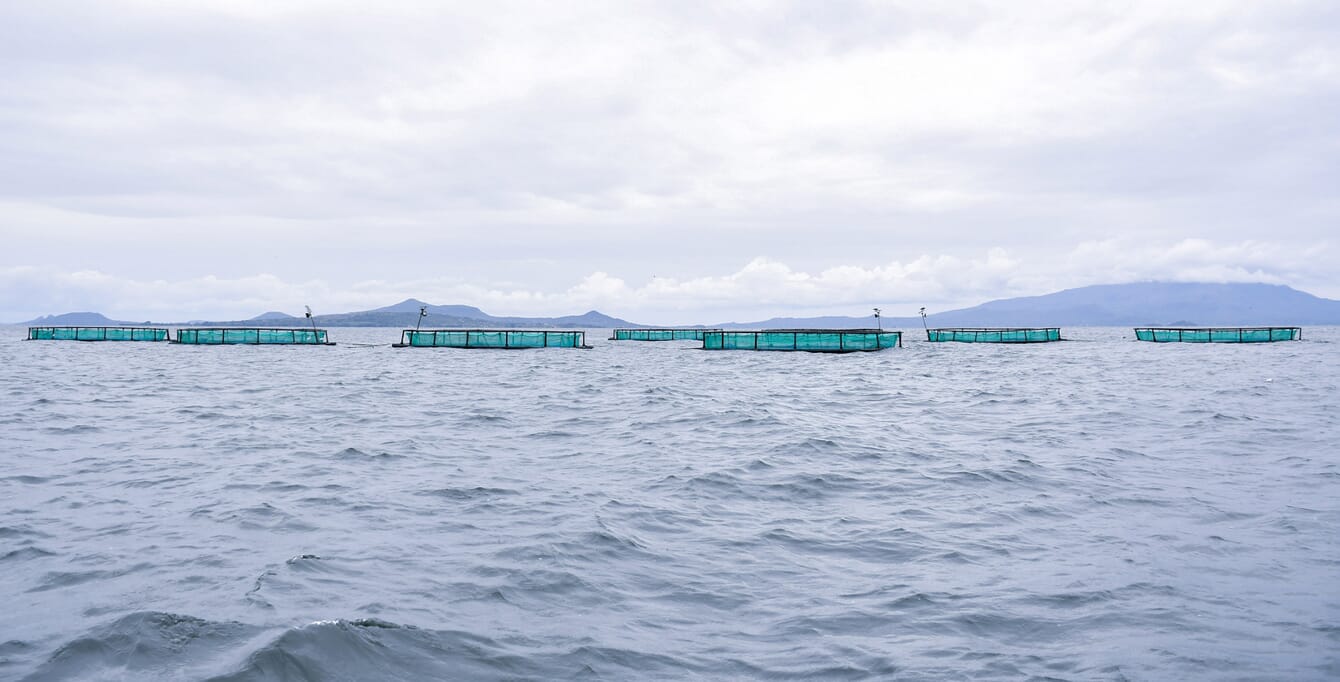
When the fingerlings arrive into the cages from the recently installed RAS facility they weigh 5 grams each
Production cycle
Before the installation of the RAS, the fingerlings were grown to 0.3 g in ponds, before being transferred to nursery cages for on-growing, and the company had only one production cycle per year. However, the fingerlings are now grown to 5 g each in the RAS facility and the company is striving to achieve two production cycles a year.
Their current average annual fish production is between 96 and 120 tonnes, while they consistently produce between 300,000 and 500,000 fingerlings per month and are actively working to increase their production to 1 million fingerlings per month by acquiring new broodstock.
The company sells its surplus fingerlings to other farmers across the country, while most of the whole fish sales are conducted through their own outlets.
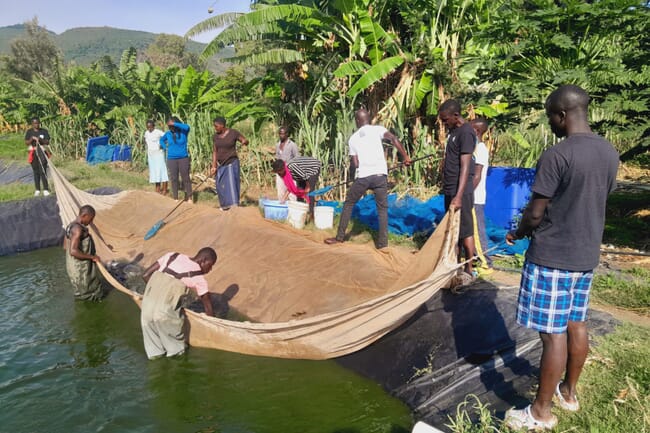
Lake View has 21 ponds serving various purposes, including broodstock, nursery, and conditioning
"The majority of our fingerlings are distributed to clients across various regions in Kenya. Approximately 90 percent of our sales are concentrated in Homabay, Migori, Siaya County, and the western region. We also serve clients in Kakamega and Vihiga for our grow-out fish and our primary distribution network for these revolves around our six strategically positioned outlets that span from the island to the farm gates, encompassing shops near Sena Beach, Homabay, Awendo, Migori, Mavera, and Suri," explains Millicent Awuor, Lake View’s operations manager and quality assurance expert.
She continues: "We are actively working on expanding our outlet presence, due to the notable increase in demand, as we are at times struggling to keep up with the supply requirements of our outlets. Furthermore, we remain open to exploring new territories, including the Kisumu area."
“Regarding whole fish, we offer processed options where we handle gutting, scale removal, and intestine removal to ensure that the product is ready for consumption,” Awuor adds.
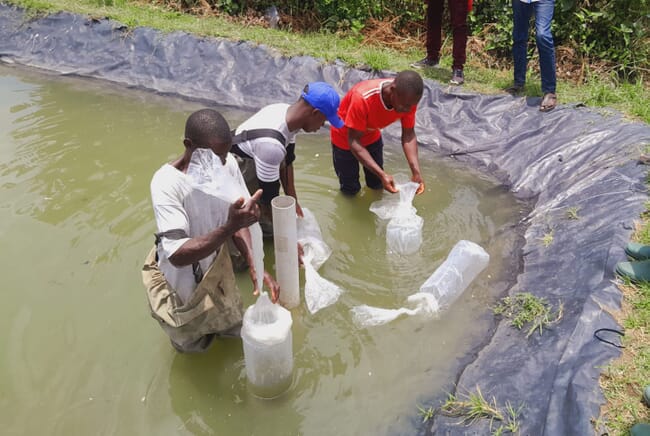
The company is currently on a mission to boost broodstock capacity and achieve a monthly production target of one million fingerlings
Sourcing feed
Lake View’s primary supplier of fish feed is Unga Feeds, although they also occasionally source from other suppliers, such as KMFRI, when necessary. However, the high cost and fluctuation of fish feed prices, compounded by the added transportation costs to their remote location, pose significant challenges.
“We aim to reduce feed costs by promoting soya bean cultivation among local farmers and eventually producing our own feed. We want to get a feed mill to ensure a sustainable source of affordable feed for our operations,” explains Charles Opanga, the company’s project manager.
Other products
In addition to fish, they also produce and sell safe drinking water and ice, which is crucial for preserving and delivering fish to customers.
“We are also actively involved in water production and treatment which we sell to island residents and markets beyond our shores. While we are not presently engaged in bottling, we are actively exploring this avenue, addressing pending issues, and aiming to commence bottling by the end of the year. Additionally, as we deal with fresh fish, it's crucial for us to preserve their freshness until they reach our customers. We therefore generate ice, with approximately 80 percent dedicated to preserving fish during transportation to our clients, many of whom are located off the island. The remaining 20 percent of the ice is available for sale, adding to Lake View's revenue streams,” explains Awuor.
Since Lake View fisheries is located on an island, this can pose logistical challenges due to ferry timings.
“To overcome this, we have set up a cold store on the island to preserve fish before transportation to the mainland. We also provide ice to traders to maintain fish quality. Our main challenge is the cost of energy, as we're not connected to the main grid and have to use generators. We plan to explore green energy options like solar power to reduce costs,” adds Opanga.
Women and youth empowerment
Lake View is committed to fostering gender inclusivity, exemplified by the fact that 60 percent of their workforce are women, and the company is led by a female CEO. They implement role rotations to empower women in roles traditionally perceived as male-dominated, and they also run a graduate training programme designed to offer recent graduates valuable hands-on experience, enabling them to acquire practical skills and establish industry connections.
“We take great pride in having Ms Michelle Mbeo as our CEO and director. Her remarkable track record of achievements in steering the company to success is undeniably motivating. She exemplifies that not only can a woman excel as a CEO and director, but she can also effectively manage all aspects of the business. Her journey inspires all of us, making us believe that one day we can also reach the pinnacle of our careers as CEOs or directors in a company," says Awuor.
"Furthermore, Lake View is a company that actively fosters gender equity and empowers women to grow within the organisation. An excellent example of this is the company's maternity leave policy. Unlike many private companies, Lake View not only offers maternity leave but also ensures job security during this period. Knowing that you can take maternity leave and return to your job with confidence is truly empowering,” Awuor added.
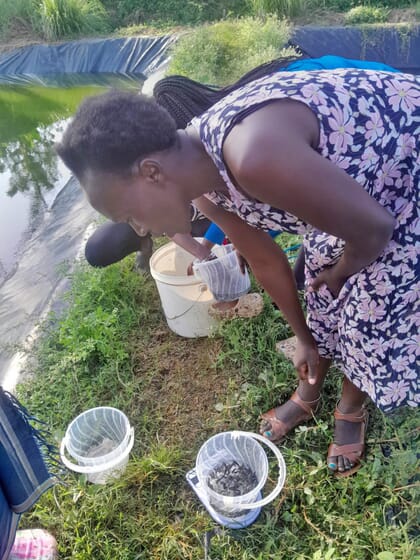
60 percent of Lake View's workforce are women, and the company is led by a female CEO, Ms Michelle Mbeo
Future plans
As the company embarks on its mission to boost broodstock capacity and achieve a monthly production target of one million fingerlings, they are improving incubation systems, expanding broodstock ponds, and planning to scale up their cages on the lake once they reach their projected hatchery output. To achieve these goals, they are actively seeking financial and technical support, focusing on energy, technology, marketing, the use of (and production of) black soldier fly larvae for feeds, and water purification to benefit the broader community.
“At the moment, we have a few key areas where support would greatly benefit us. Firstly, we require financial support to facilitate our expansion plans. Secondly, we are actively seeking technical support, particularly in the fields of marketing and technology. While we possess a solid foundation and knowledge, expertise in implementing advanced technologies like the RAS is crucial. We are also interested in conducting trials involving black soldier fly as part of our effort to reduce feed costs. To do this effectively, we're looking to engage with external experts who excel in BSF research and could help us establish soldier fly trials at our facility," Opanga concludes.




